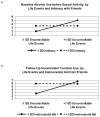Supportive friendships moderate the association between stressful life events and sexual risk taking among African American adolescents
- PMID: 19290716
- PMCID: PMC2657930
- DOI: 10.1037/a0013240
Supportive friendships moderate the association between stressful life events and sexual risk taking among African American adolescents
Abstract
Objective: This study examined whether uncontrollable stressful life events were associated with sexual risk taking among adolescents across a 1-year period, and whether supportive friendships modified associations.
Design: Participants were 159 sexually active African American adolescents (57% male; mean age [SD] = 17.0 [1.5] years at baseline). Participants were recruited for in-person interviews through random digit dialing in one inner-city neighborhood characterized by high rates of poverty and crime relative to the surrounding city.
Main outcome measures: Dependent variables included substance use before sexual activity and inconsistent condom use.
Results: Among adolescents who reported low levels of supportive friendships, uncontrollable stressors were associated with greater levels of sexual risk taking over time. In contrast, uncontrollable stressors were not associated with sexual risk taking among adolescents who reported high social support from friends; risk taking was typically moderate to high among these adolescents.
Conclusion: Different processes may explain sexual risk taking among adolescents with varying levels of social support from friends. Adolescents with low support may be prone to engagement in health risk behavior as a stress response, while adolescents with high support may engage in risk behavior primarily due to peer socialization of risk.
(c) 2009 APA, all rights reserved
Figures
References
-
- Aiken LS, West SG. Multiple regression: Testing and interpreting interactions. Newbury Park, California: Sage Publications, Inc; 1991.
-
- Allison KW, Burton L, Marshall S, Perez-Febles A, Yarrington J, Kirsch LB, Merriwether-DeVries C. Life experiences among urban adolescents: Examining the role of context. Child Development. 1999;70:1017–1029. - PubMed
-
- Attar B, Guerra N, Tolan P. Neighborhood disadvantage, stressful life events, and adjustment in urban elementary-school children. Journal of Clinical Child Psychology. 1994;23:391–400.
-
- Berenson AB, Wiemann CM, McCombs S. Exposure to violence and associated health risk behaviors among adolescent girls. Archives of Pediatric Adolescent Medicine. 2001;155:1238–1242. - PubMed
-
- Berndt TJ. Transitions in friendship and friends’ influence. In: Graber JA, Brooks-Gunn J, Petersen AC, editors. Transitions through adolescence: Interpersonal domains and context. Mahwah, New Jersey: Lawrence Erlbaum Associates; 1996. pp. 23–53.


